How to Check Email in cPanel:
What is cPanel??
cPanel is a web-based control panel that allows website owners to manage their website and hosting services without needing to have a lot of technical knowledge. It provides a user-friendly interface with a range of features that make it easy to manage web hosting, email, and other website-related services. With cPanel, users can perform tasks such as creating email accounts, uploading website files, setting up databases, installing applications, and managing website backups, all from a single dashboard. It also provides features such as website statistics, security options, and domain name management. Essentially, cPanel is a tool that simplifies the management of website-related services, making it accessible to people who may not have a lot of technical knowledge or experience.
After email setup is complete
Once your email is set up, it’s fairly easy to check it through cPanel.
cPanel is used on most hosts these days and to get to it, or to check to see if your host uses cPanel, all you have to do is type in https://yourdomain.com/cpanel.
When you get there, you should be greeted with a login resembling the one below.
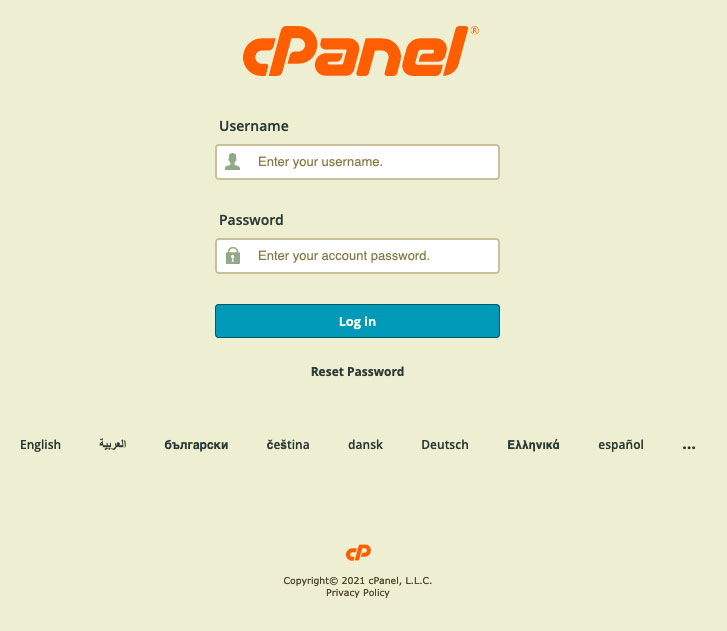 Enter your login credentials here. If you don’t know your login credentials, contact your hosting company.
Enter your login credentials here. If you don’t know your login credentials, contact your hosting company.
Once you are logged in to cPanel, you will be brought to the cPanel dashboard.
From here, click on “Email Accounts.”
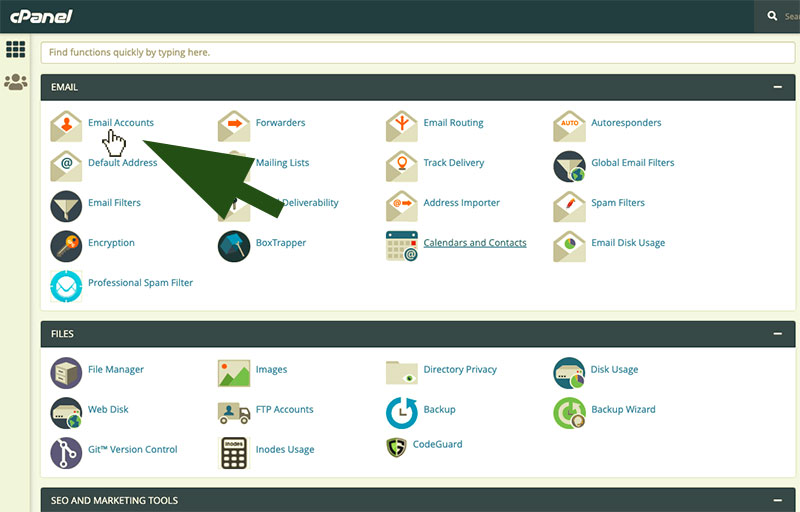
Next you will be brought to a screen with your email address or addresses on it. Click the button on the right that says “Check Email” in the row of the email address you wish to check.
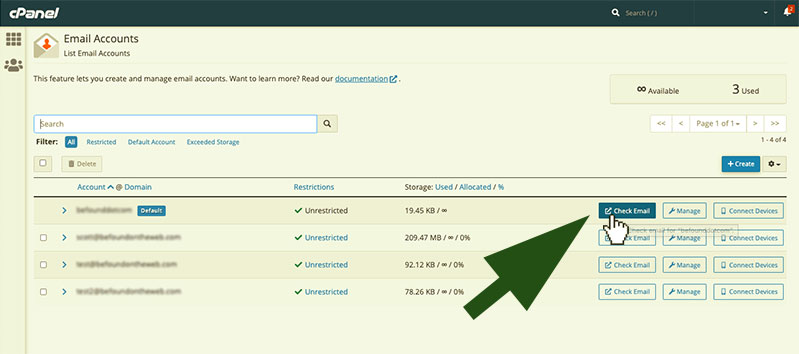
From here, simply click on the name of the email client you wish to use. Roundcube works best for me, so I click the button next to the Roundcube icon.
You can also click the checkbox that says “open my inbox when I log in” to bypass this step next time you check your email, and be taken directly to your inbox.
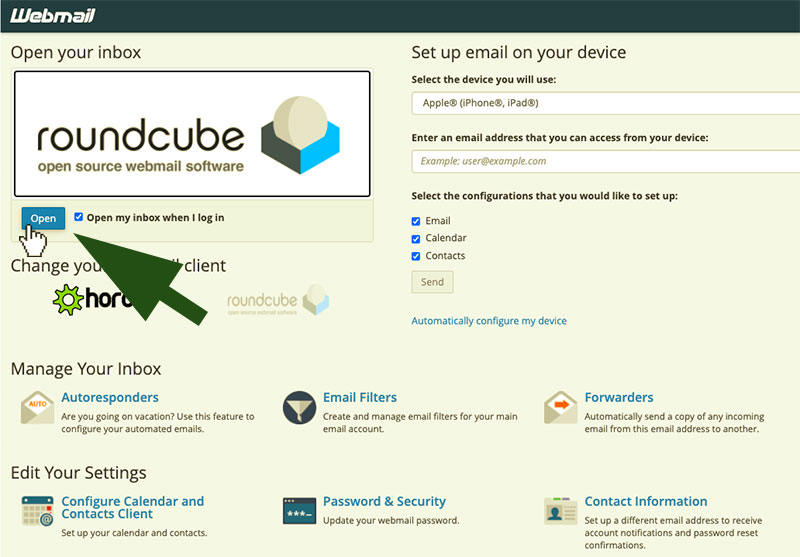
That’s it. You’re in your inbox. You can now open any emails you have received and compose new outgoing emails to your heart’s content.
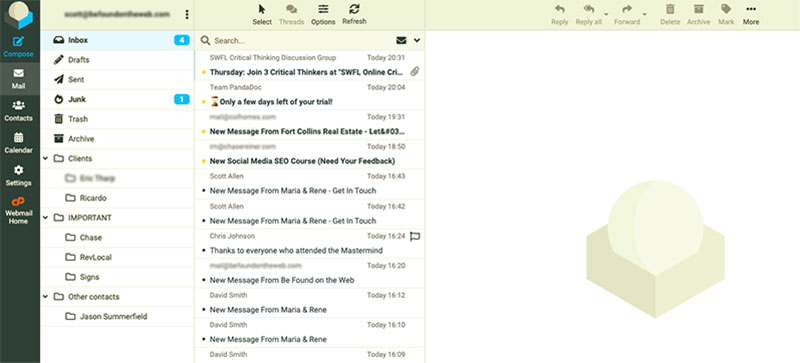
When you are finished, log out of Roundcube.
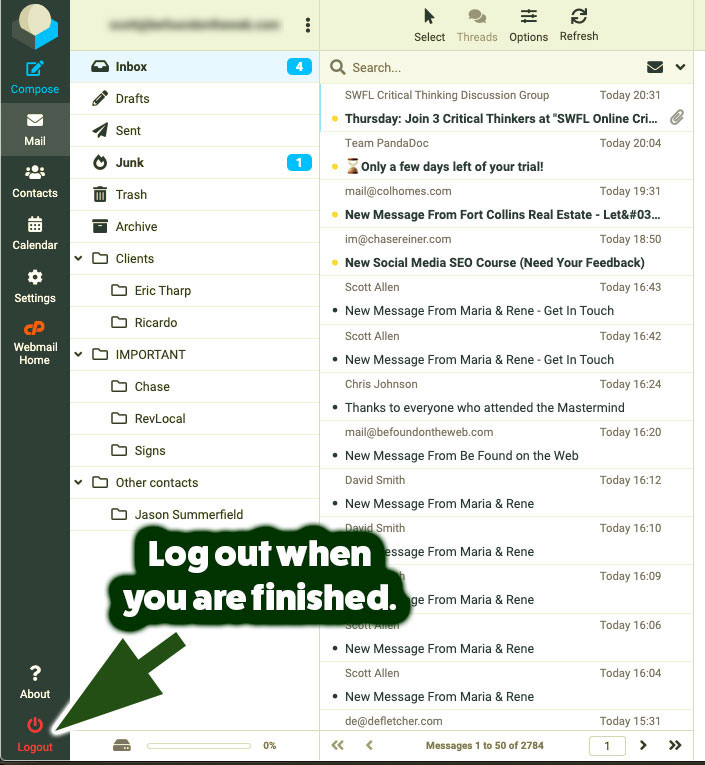
Using cPanel to check email can be helpful for several reasons
Access from anywhere
Checking email through cPanel allows users to access their emails from any device with an internet connection, without needing to download or install additional software.
Easy to use interface
cPanel provides a user-friendly interface for managing email accounts, making it easy for users to check and manage their emails.
Advanced email management options
cPanel provides advanced email management options, such as creating email accounts, setting up email forwarders, and setting email account quotas.
Security
cPanel provides security features such as spam filters, virus protection, and email authentication, helping to keep emails secure and preventing unauthorized access.
Integration with other cPanel features
cPanel integrates with other features such as website management and domain name management, providing a comprehensive solution for managing web hosting and email in one place.
Checking email through cPanel provides a convenient and user-friendly way to manage email accounts, with advanced email management options, security features, and integration with other cPanel features.
FAQ:
Q: Is cPanel included in all web hosting plans?
A: No, cPanel is not included in all hosting plans. Some hosting providers offer cPanel as a standard feature in their hosting plans, while others may offer it as an add-on or not at all. It’s important to check with the hosting provider to see whether cPanel is included in the hosting plan and what features are available. Additionally, some hosting providers may offer alternative control panels to cPanel, so it’s important to research and compare different options to find the one that best fits your needs.
Q: Are there alternatives to cPanel?
A: Yes, there are several alternatives to cPanel that offer similar features and functionality. Some of the most popular cPanel alternatives include:
Plesk: Plesk is a popular control panel that offers a user-friendly interface and a range of features for managing web hosting, email, and other website-related services. It is often used by hosting providers as an alternative to cPanel.
DirectAdmin: DirectAdmin is another popular control panel that provides a similar range of features to cPanel, including email management, website management, and domain name management.
Virtualmin: Virtualmin is an open-source control panel that is designed for managing virtual servers. It provides a range of features for managing web hosting, including website and email management.
ISPmanager: ISPmanager is a control panel that is designed for managing hosting services, including website hosting, email hosting, and domain name management. It offers a user-friendly interface and a range of features for managing hosting services.
CyberPanel: CyberPanel is a lightweight control panel that is designed for managing web hosting on cloud servers. It offers a range of features for managing website and email hosting, as well as a range of security features.
There are several alternatives to cPanel that offer similar functionality and features. It’s important to research and compare different options to find the one that best fits your needs and budget.
Q: Is cPanel secure?
A: Yes, cPanel is generally considered to be a secure web-based control panel for managing web hosting and related services. cPanel provides several security features to protect users’ websites and data, including:
Password-protected directories: cPanel allows users to set up password-protected directories to restrict access to sensitive areas of their website.
IP address blocking: cPanel allows users to block IP addresses or ranges of IP addresses to prevent unauthorized access to their website or server.
SSL/TLS encryption: cPanel supports SSL/TLS encryption, which provides secure communication between the user’s web browser and the server.
Two-factor authentication: cPanel offers two-factor authentication, which adds an additional layer of security by requiring users to enter a second authentication factor, such as a code sent to their mobile phone.
Automatic updates: cPanel provides automatic updates for the software it manages, which can help to keep websites and servers secure by fixing known vulnerabilities.
Overall, cPanel offers several security features that can help to protect websites and data from unauthorized access and other security threats. However, it’s important for users to follow best practices for website and server security, such as using strong passwords, keeping software up-to-date, and regularly backing up data.
Additional Resources
For more information, you can check out the cPanel website.